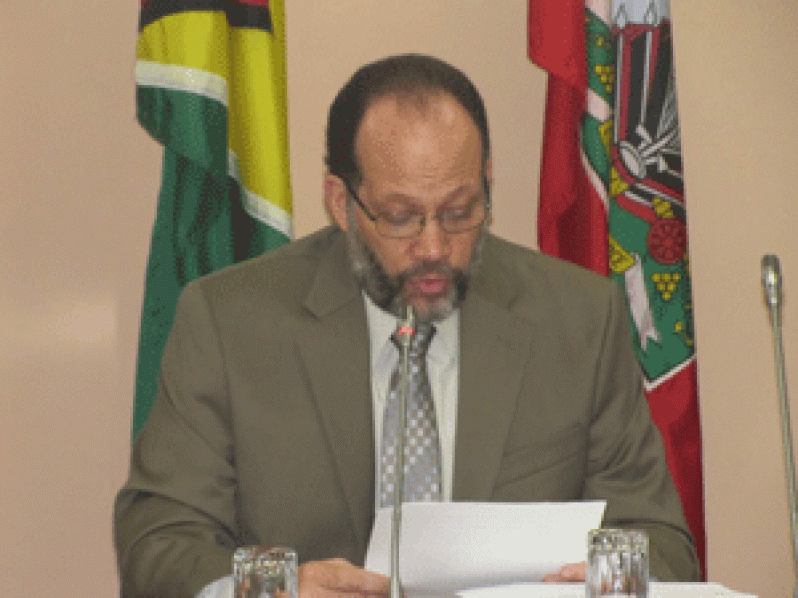– 29th Council of Ministers Meeting held
THE 29th Meeting of the Caribbean Community (CARICOM) Council of Ministers was held yesterday, when several important matters were discussed including the Secretariat’s work programme and budget.  Speaking at the opening ceremony at CARICOM’s Headquarters, Turkeyen, Secretary General, Ambassador Irwin LaRocque said the Council is meeting at a time when the Community continues to ask hard questions of itself and the role of all its organs, bodies and institutions, against a background of the demand by Heads of Government that its actions must make a meaningful impact on the ground.
Speaking at the opening ceremony at CARICOM’s Headquarters, Turkeyen, Secretary General, Ambassador Irwin LaRocque said the Council is meeting at a time when the Community continues to ask hard questions of itself and the role of all its organs, bodies and institutions, against a background of the demand by Heads of Government that its actions must make a meaningful impact on the ground.
The Council will be given a presentation on proposals for the restructuring of the Secretariat. This is expected to generate positive changes which the Secretary General said must be welcomed by all.
“Change will have to be managed; it will not be easy; it will definitely require a new mindset; a new way of doing things,” he said.
He explained that while staff members of the Secretariat are hardworking, he questioned if they are organised enough to do what is required. He maintained that there must be a clear understanding that the Secretariat can no longer, “be all things to all persons if we are to be efficient and effective, irrespective of the role identified for us to play.As such, there must be prioritisation which must go along with results, accountability, and value for money in reference to the Secretariat, as well as other institutions within the Community in going forward.
“The functions of this Council are pivotal to the efficient operation of the Community’s integration arrangements; an issue that it has previously sought to address with a view of fulfilling its role as envisaged under the revised Treaty of Chaguaramas.”
Discussions by Council of Ministers will also benefit from a review that was undertaken by the Community Council in 2004 at a retreat.
“There is no doubt that many of the recommendations from that 2004 review remain valid and relevant. It is necessary that this Council, a vital cog in the Community wheel, must once again consider its role and functions as we go forward in this current restructuring process,” Ambassador LaRocque said.
The Revised Treaty states that this Council has the authority to give the strategic directions to pursue the policies enunciated by the Heads of Government. Article 13 from which this mandate derives also gave Council members the task to ensure timely implementation of the Community’s decisions, which can best be achieved through prioritisation that will influence the other task of mobilising and allocating resources for the implementation.
“The Council is also responsible to function as a preparatory body for meetings of the Heads of Government to determine what matters may be laid before them.
“In other words this Council should be the fulcrum around which the Community swivels. It is within your purview to discuss whether these highly pivotal functions are being adequately discharged. Obviously this review cannot be completed at any one meeting but these discussions are urgent and must form a major part of the introspection which our Community is undertaking,” Ambassador LaRocque said.
With regard to the Secretariat’s budget, he said that they are fully aware of the fiscal difficulties with which many member states are faced; a reality that they are struggling to cope with.
The Secretariat’s budget has been frozen from 2008 to 2010 and was further reduced last year.
The Secretary General explained that while they have been able to maintain the level of service, they have had to undertake cost- cutting measures, including measures such as not filling vacant posts, some of which are necessary for the efficient management of the institution and the delivery of its work programme.
“Should we endure any further cuts in real terms without prioritising mandates and an already over ambitious work programme, we will become that much more inefficient, given the resources that are available to us, there is also the matter of the rising arrears which restricts our cash flow and further limits our ability to perform,” he pointed out.
Meanwhile, Suriname’s Minister of Foreign Affairs and Chairman of the Council, Winston Lackin, said that over the last decade there has been a lot of discussions with regard to the Community but decisions have not been taken largely due to financial and other constraints, noting that more than 90 percent of the issues on yesterday’s agenda have been there for a long time.
He pointed out that the time has come for this body to do things differently; making reference to the fact that CARICOM is not even in the position to find the necessary funding to assure security in the Region, an aspect he said that is directly related to member states overall development.
“We need to find means of acquiring funds so as to get rid of the situation whereby we depend too much on funding from institutions outside of the Region; we have to create CARICOM enterprises and business opportunities…lets join our forces, natural resources, and our intelligence to have the possibility of controlling and directing our own institution and come to a position where we can decide our own destiny,” Lackin said.
This meeting is an important one in preparation for the CARICOM Heads of Government Meeting (CHOGM) to be held in March in Paramaribo, Suriname.
CARICOM member states must join forces to resolve funding issues
SHARE THIS ARTICLE :
Facebook
Twitter
WhatsApp



.jpg)









